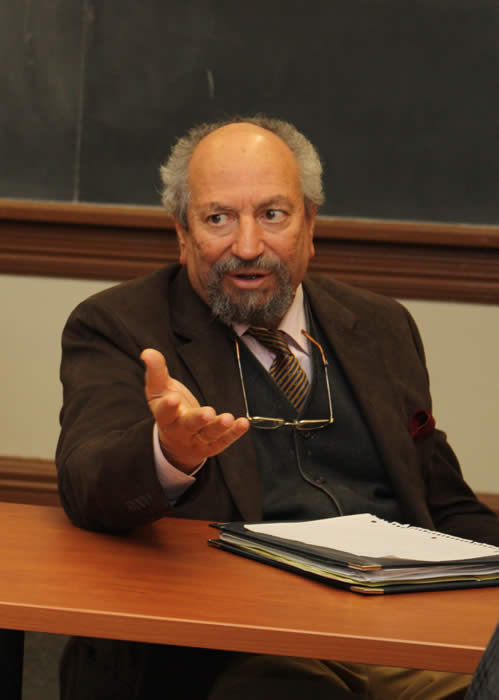ACTIVISTS, JOURNALISTS & SCHOLARS TO DISCUSS EGYPT IN TRANSITION
|
"What happens in Egypt will be a determining factor in what happens in the Middle East," said Center for Public Scholarship director Arien Mack. "The New School is the ideal place in the U.S. to hold this discussion, given its deep commitment to free inquiry and democratic transitions around the globe." The conference begins at 10 A.M. with a roundtable discussion on the Roots and Character of the Egyptian Revolution with Cairo jounalist Yasmine El-Rashidi; Mohammed Tabishat, assistant professor of anthropology, American University in Cairo; Joe Stork, deputy director, Middle East and North Africa Division, Human Rights Watch; Hazem Fahmy, economist for the United Nations Department of Economic and Social Affairs; and Atef Said, human rights lawyer. Possible Outcomes of the Egyptian Revolution (beginning at 2:30 P.M.) will feature insight from Juan Cole, Professor of History, University of Michigan and author of Engaging the Muslim World; Shaheeda el-Baz, executive director, Arab and African Research Centre, Cairo; Nathan Brown, professor of political science and international affairs, The George Washington University; and Samer Soliman, associate professor of political economy, American University in Cairo. The conference will conclude at 6:30 with a keynote lecture on Egypt's future by Saad Eddin Ibrahim, founder of the Ibn Khaldun Center for Development Studies, followed by a question-and-answer session moderated by CUNY's Talal Asad. Egypt in Transition will also be the topic of 14th issue in the Social Research journal's Transitions series, which began in 1990 by examining the transitions in Eastern and Central Europe following the collapse of Communism. Since then, Social Research has explored transitions in South Africa, China, sub-Saharan Africa, and India. Egypt in Transition is organized by Arien Mack, Director of the Center for Public Scholarship, and Alfred and Monette Marrow Professor of Psychology at The New School for Social Research. This conference is made possible by generous support from the Carnegie Corporation of New York and The Office of the Provost of The New School. |
| About the Center for Public Scholarship The Center for Public Scholarship aims to bring the best scholarship and expertise to bear on current, pressing social issues in a way that makes the scholarship accessible to the public and simultaneously deepens understanding of what may be at stake and how to proceed. It seeks to become a catalyst for events that draw on the humanities, social sciences, design, and public policy and have the potential of accomplishing our mission, namely, enhancing the public's understanding of the significant issues of our time. The Center is dedicated to promoting academic freedom and freedom of inquiry, goals that are rooted in the earliest history and ideals of The New School. For more information, visit www.newschool.edu/cps About The New School ### |
 |
COMMUNICATIONS AND EXTERNAL AFFAIRS |
| 79 Fifth Avenue, New York, NY 10003 www.newschool.edu |
PRESS RELEASE |
Media Contacts: Sam Biederman, |
|
|
